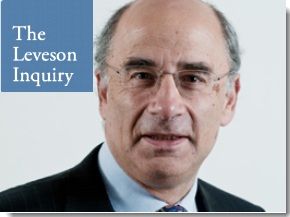By Michael Collins
(Washington, 2/30/2012) At the end of Monday's Leveson Inquiry with Tony Blair
on the stand, Lord Justice Leveson sent the credibility of the effort's
summary findings straight to Hell. After Blair's pressured
presentation and an interruption by a protester who called Blair a war
criminal, Leveson began an odd exchange with the former Prime Minister.
It began with this request to Blair:
Lord Justice Leveson:
2 So whatever assistance you can give, who have
3 thought about how you change things for the future, I'd
4 be very interested. Let me give you some potential
5 issues. (May 28 transcript page 38)
If things had ended there, this could be seen as a modest invitation, one Leveson might have offered any number of witnesses as a general courtesy. But the justice was not finished. He outlined specific issues covering five pages of transcript.
This was no a casual request. We witnessed the supposedly objective judge of press excesses recruiting a former politician who had just spent several hours intermittently bemoaning to Queen's Counsel (QC) Robert Jay just how difficult it was for him to deal with the press.
During previous testimony, QC Jay had outlined events and actions suggesting that Blair traded regulatory favors for editorial support by the Murdoch publications. Also, Blair testified that his wife had initiated thirty separate legal actions (of varying degree) due to what Mrs. Blair saw as abusive press coverage aimed at her.
Nevertheless, Blair was asked to suggest an independent regulatory authority to provide "redress" for victims of press excesses. He was asked to suggest how such a regulatory body would be structured and the types of people who might man it to make sure the press doesn't harm public figures.
Leveson mentioned the need for "prior notification" as a key function of the independent regulatory body. In this context, the justice was referring to stories with a set of tough allegations that could be run by the subjects prior to publication.
Lord Justice Leveson:
10 ... One
11 possibility might be to say there is some mechanism
12 within the regulatory regime that allows the press to
13 say, "Look, we have this story, we don't feel we ought
14 to notify the subject of it for these reasons: he'll
15 destroy the evidence", or whatever -- it doesn't matter
16 -- and to get a view. (Transcript pages 39 - 40)
Prior to Leveson initiating the extended colloquy, Queen's Counsel Robert Jay had examined Blair on specific topics. For example, Jay outlined a set of events and statements suggesting that Blair had exchanged regulatory favor in return for political support. Jay even asked the former Prime Minister if some of his actions were to "curry favor" with Murdoch.
In the past, Jay has saved his best evidence and most pointed questions until the end of testimony. But Monday, Leveson simply cut him off and began his extended exchange with Blair. Then the justice abruptly ended the hearing without asking Jay if there were any more questions.
Leveson extended the offer of collaboration to Blair despite his stated hostility to the press, the litigious impulses of Mrs. Blair for perceived affronts, and Blair's close personal relationship with Murdoch.
Did it occur to Lord Justice Leveson that by offering Blair special input he was providing special favor to the man whose newspapers had committed the atrocious, illegal acts that inspired the hearings in the first place?
(Note: You can view every article as one long page if you sign up as an Advocate Member, or higher).






